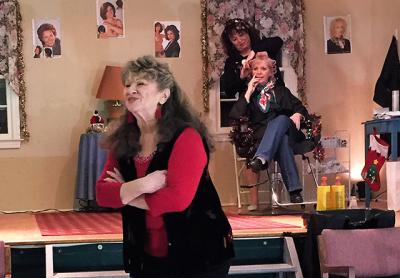A Spirited ‘Steel Magnolias’ in Springs

“Steel Magnolias,” Robert Harling’s 1987 comedy-drama that became widely known thanks to the star-studded 1989 film, has over the years been met by critics with praise, derision, and everything in between. While one critic said, “The writing is filled with clever, country-fried witticisms and hilarious one-liners,” another wrote, “The script is formulaic and not as funny as it ought to be.”
Judging by the almost constant laughter at the opening night on Friday of the Springs Community Theater Company’s production of “Steel Magnolias,” the full house clearly agreed with the favorable verdict.
The play is set entirely within Truvy’s beauty salon in Chinquapin, La., in the 1980s. Unlike the film, which moved outside into the community and included a larger cast of characters, the play has only six principals, all women for whom the salon functions as a kind of social club, where they gossip, catch up on one another’s lives, vent grievances, and dispense advice.
The set at the Springs Presbyterian Church spills off the stage into the audience’s space. While two styling chairs occupy the stage, a couch, a table with magazines, an old-fashioned hair dryer, and a manicure station are close enough to the audience that, while the production doesn’t entirely dispense with the fourth wall, it allows the viewer to feel more like an eavesdropper than a spectator.
Truvy is the anchor of the play, and Susan Conklin inhabits the role completely, her funny one-liners and observations underlain by wry common sense. The other characters are Annelle (Claire Hopkins), a shy young woman who is new to the community; Shelby (Virginia Haller), whose imminent marriage to Jackson is the subject of discussion in the first act; M’Lynn (Jayne Freedman), Shelby’s mother and sometime adversary; Clairee (Shelly Bennett), the happy widow of the town’s recently deceased mayor, and Ouiser (Vay David), who storms in with a furious but comical rant about M’Lynn’s husband, whose habit of shooting birds is unnerving her hairless dog.
The four parts of the play cover three years, during which Shelby’s marriage, pregnancy, and successful, if premature, delivery of Jackson Jr. provide the narrative drive and emotional depth. It is revealed in the first act that Shelby has Type 1 diabetes, which makes pregnancy a risky proposition for both mother and child and explains why M’Lynn seems less enthusiastic than the other women about Shelby’s impending marriage and, later, her pregnancy. Shelby is for the most part free-spirited and optimistic, while her mother, who is a psychotherapist, tries gamely to tamp down her misgivings about her daughter’s choices.
As the play progresses and Shelby’s optimism becomes more and more desperate, the comedy, while never disappearing, becomes increasingly modulated by the characters’ concerns about Shelby’s health. The humor stays sharp, and the tragedy for the most part avoids the thin ice of soap opera.
All the performances are persuasive, as the characters gradually reveal more of themselves and their emotional depth. It’s a long play with nonstop dialogue that moves seamlessly from character to character and shifts constantly from upstage to downstage, a tribute to the cast and directors, Diana Horn and Kathleen Horn.
If Ms. Conklin embodies the relatively centered Truvy, Ms. David enters every scene like a blunt but hilarious force, her booming voice, angry facial expressions, and general vituperation capturing perfectly a character whose cynicism only modulates toward the end of the play. Think Susie Essman on steroids.
Ms. Haller conveys the optimism of a character whose favorite — whose only — color is pink, while subtly suggesting the fears she tries to downplay when among the other women. Ms. Freedman has the most difficult role, as she must shift between being an upbeat member of the gossip-centered social club while worrying about and trying to protect her daughter (and herself) without being overbearing. The play concludes with her extended monologue, which moves between forced cheer and sadness before she finally, for the first time in the play, gives in to her emotions and breaks down completely. She carries it off persuasively.
Ms. Hopkins handles seamlessly a transformation from diffident outsider to comfortable member of the group to born-again Christian whose vacation will be spent at a Bible camp. Ms. Bennett lights up each scene she takes part in, her jovial aunt-like demeanor offset by comments such as, “Well, you know what they say: If you don’t have anything nice to say about anybody, come sit by me.”
The final two performances will take place tomorrow and Saturday at 7 p.m. at the Springs Presbyterian Church. Tickets are $20, $15 for senior citizens and students. One recommendation: Bring a seat cushion for the steel folding chairs.
